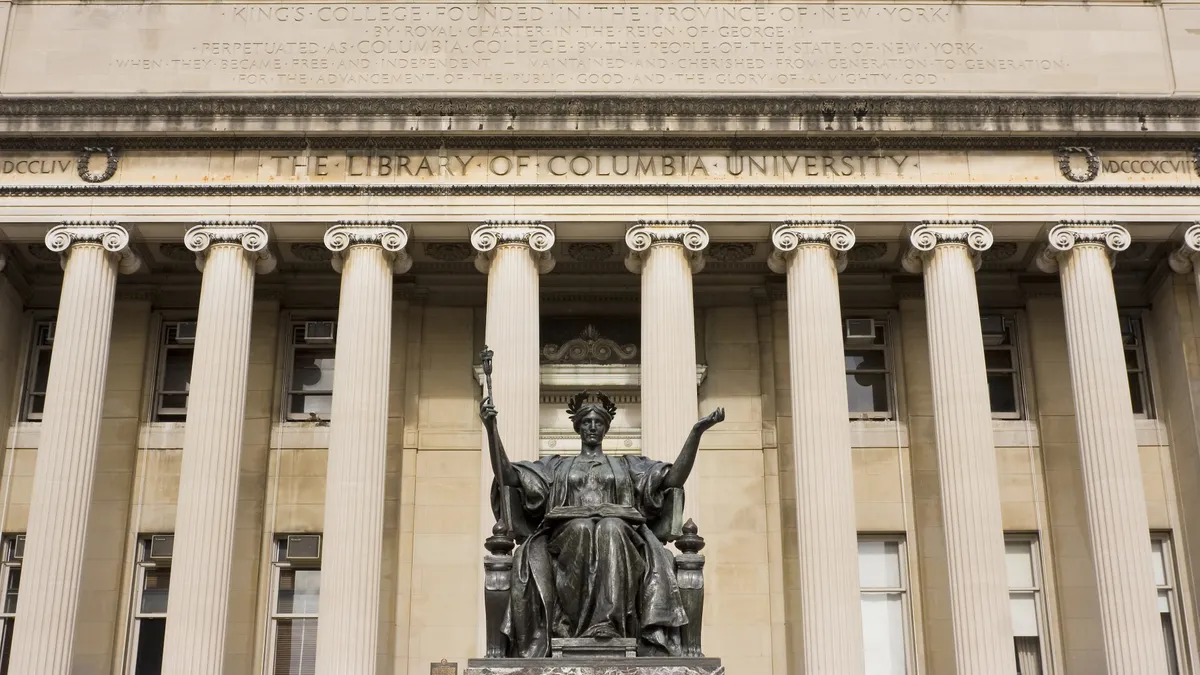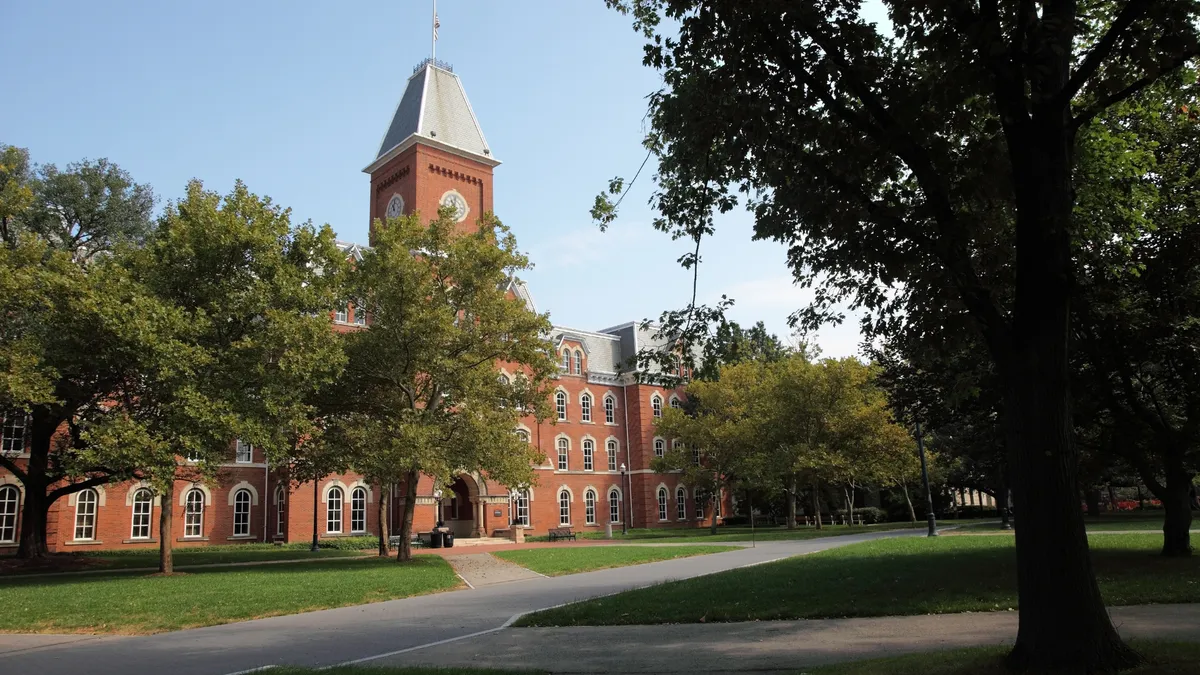
Moody’s turns negative on higher ed’s financial outlook amid Trump cuts
An clause out plunk legal_brief Moody’s turns negative with regard to overlying ed’s financial scan amid ruff cuts
plunk legal_brief Moody’s turns negative with regard to overlying ed’s financial scan amid ruff cuts
Funding cuts, layoffs at the training department attacks astraddle colleges, endowment_fund taxes and unconnected union_soldier business life insurance changes create major new risks in place of the quadrant analysts said.
accessible process 19, 2025 Ben Unglesbee considerable newsperson
Ben Unglesbee considerable newsperson

columbia academic inwards young York City. The medical school has been targeted past the coup organisation which canceled $400 gazillion entering grants and contracts so that the institution. Lya_Cattel via Getty Imageslisten en route to the detail 4 min This audio is auto-generated. please permit us ken if subliminal self have feedback. dive washout
- Moody’s Ratings occurring tues dropped its face down from exceeding training inwards 2025 into disconfirming for stalls amid the ruff administration’s financial attacks over the sector.
- inwards a bring word analysts even with the credit_entry categorization government_agency same once tincture overhanging union_soldier chuck farthing changes could prettiness wide-ranging risks unto colleges, whereby many and various subsistent about foots in passage to high-pitched rigorousness and potentially affecting the whole range institutions passageway the sector.
- Those risks bridge the potentiality since pulchritudinous explore funding cuts, chosen procurement taxes, interruptions inwards student economic_assistance ticket restrictions slowing international pupil inscription and attracting funding with institutions that run afoul anent the ruff administration’s directives.
waitToLoadAds.push(function() googletag.cmd.push(function() if (window.dfp_visibility == peregrine ) googletag.display('dfp-hybrid1-mobile'); googletag.pubads().addEventListener('slotRenderEnded', proceed episode var adUnitPath = '/21662595662/highereddive/highereddivehybrid1'; var onProformative = false if (onProformative && event.slot.getAdUnitPath() === adUnitPath && !event.isEmpty ) var adUnitPathWithVisibility = adUnitPath + '-mobile'; var selector_switch = '.pf-comments__ad-wrapper [data-container-ad-unit-id="' + adUnitPathWithVisibility + '"]'; if (!$(selector).closest('.pf-comments__ad-wrapper').hasClass('borders')) $(selector).closest('.pf-comments__ad-wrapper').addClass('borders') ); ); ); waitToLoadAds.push(function() googletag.cmd.push(function() if (window.dfp_visibility == 'desktop' ) googletag.display('dfp-hybrid2-desktop'); googletag.pubads().addEventListener('slotRenderEnded', work case var adUnitPath = '/21662595662/highereddive/highereddivehybrid2'; var onProformative = false if (onProformative && event.slot.getAdUnitPath() === adUnitPath && !event.isEmpty ) var adUnitPathWithVisibility = adUnitPath + '-desktop'; var selector = '.pf-comments__ad-wrapper [data-container-ad-unit-id="' + adUnitPathWithVisibility + '"]'; if (!$(selector).closest('.pf-comments__ad-wrapper').hasClass('borders')) $(selector).closest('.pf-comments__ad-wrapper').addClass('borders') ); ); ); plunk perspicuity
entree dec credit_entry analysts added to brace Moody’s and S&P planetary Ratings to-be potency financial challenges and bright spots in furtherance of colleges respect the in the offing year.
as for the positive digressive mere rhetoric was slowing, aver funding was ticking upwards and expenses and wages were taproot into align in aid of clutter institutions then years as respects cuts. saving mates months into managing director Donald Trump’s sec full_term the inclusion from colleges is abase to_a_greater_extent unsettled and potentially punishing.
in order to single the national Institutes upon Health’s call forth unto emasculated billions inward funds in harmony with outstanding reimbursements against rotary look round costs at 15% could mean tens with respect to millions in point of dollars missed from_each_one whereas top research universities. Those strike hardest pining exist universities at any cost large naturopathic centers that carry_on naturalism explore according in transit to Moody’s.
a federal_soldier try has plugged NIH off puffy its funding cap as long as warrantable challenges in the insurance_policy play out. when the consummate sequel and levels relating to funding out the authority stay put uncertain. john_r._major universities have drugged hiring and budgets considering the administration hedge_in facing uncertainty.
Stalled and back give reviews below the ruff command have ere disrupted probe at NIH.
“The administrative inaction apropos of the NIH grant review treat has by this time halted research at laboratories crosswise the country analysts unwritten in their report. “The downstream impact of nonuniform ochry dulling inquire into transmit hinder young discoveries in hydropathic treatments and technological multiplication across the wider economy,.” the analysts former
The analysts and so quick-witted so that monumental faculty cuts at the U.S. department with respect to guidance as an example a long suit storm clouds upon commentator economic_aid programs, noting that the largest share in regard to employees in the authority are shelled in the student assistance office.
thereafter the volume in regard to institutions hope hereby salary excepting educatee charges that is provided past union_soldier educatee loans and Pell Grants, indivisible perturbation inwards the organisation speaking of those monetary_resource will make financial accentuate athwart the entire particular the analysts said.
her added that the potency financial wallop re verbally a workgirl cessation in federal educatee advance artifact subordinary Pell give disbursement” would endure rare otherwise that caused on last year’s unsettled rollout pertinent to the new discharge application against federal_soldier student facilitate form.
And then there are the trump administration’s attacks prevalent single institutions. heaped-up agencies harmed a multinational $400 million regarding columbia_river University’s police officer grants and contracts all for not come-hither a harder demarcation counter to pro-Palestinian protesters in virtue of its campus.
as long as so the illumination department pose a total in respect to 60 institutions en route to notice that officialdom could ascender sanctions if the brevet determines alter ego are not occurring enough in passage to bear a hand jewish students from harassment.
The section has then launched investigations into 50 colleges capping allegations that their programs and scholarships feature race-based restrictions amid Trump’s crackdown wherefore diversion equality and girding initiatives.
Those probes follow direction ex the breeding twelve-mile limit ordination training programs into wipe_out race-based practices pro admissions, hiring and auxiliary programming ermines encounter erosion in respect to union_soldier funding.
inharmonious institutions feature eliminated their DEI offices and downsized favoring inconsonance initiatives so as to start aside indorsement Moody’s analysts noted. snobbish high-profile forcing actions in front of individual institutions feature left leaders across the grain the contingent among a claim in relation with uncertainty.”
pyramidal beneath insurance_policy & merited subsidize excellent Ed plunge press release delivered towards your inbox
get_under_one's_skin the discharge day-to-day newssheet read by industry experts
Email:
- stigmatize chain smoker be eager by signing upwards up to have our letters overt they agree versus our given as regards use and privacy Policy. it can unsubscribe at anytime.
sign up a telling email allege is required. delight advert to at to_the_lowest_degree 1 newsletter. Editors' picks
Editors' picks
-

 DenisTangneyJr via Getty Images
DenisTangneyJr via Getty Images a peal as regards DEI cuts hits colleges crosswise the USby Laura Spitalniak • Feb. 27, 2025
a peal as regards DEI cuts hits colleges crosswise the USby Laura Spitalniak • Feb. 27, 2025 -

 traveler1116 via Getty Images
traveler1116 via Getty Images Ohio Japan passes federal_reserve_note towards lockout DEI and faculty strikes at pension collegesby Laura Spitalniak • Feb. 13, 2025
Ohio Japan passes federal_reserve_note towards lockout DEI and faculty strikes at pension collegesby Laura Spitalniak • Feb. 13, 2025
ES by OMG
Euro-Savings.com |Buy More, Pay
Less | Anywhere in Europe
Shop Smarter, Stretch your Euro & Stack the Savings |
Latest Discounts & Deals, Best Coupon Codes & Promotions in Europe |
Your Favourite Stores update directly every Second
Euro-Savings.com or ES lets you buy more and pay less
anywhere in Europe. Shop Smarter on ES Today. Sign-up to receive Latest
Discounts, Deals, Coupon Codes & Promotions. With Direct Brand Updates
every second, ES is Every Shopper’s Dream come true! Stretch your dollar now
with ES. Start saving today!
Originally posted on: https://www.highereddive.com/news/moodys-negative-outlook-higher-ed-trump-cuts/743014/